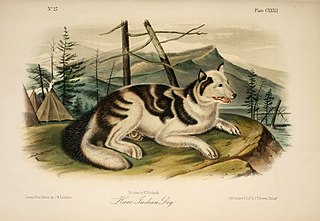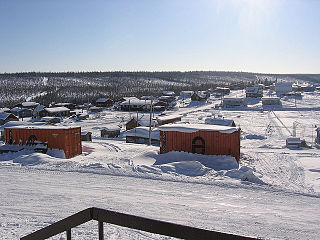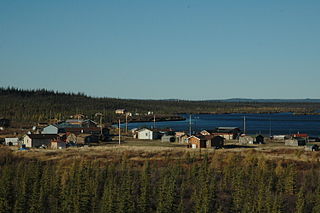John T'Seleie (born September 11, 1950) is a territorial level politician. He served as a member of Canada's Northwest Territories Legislature from 1983 until 1987.
T'Seleie was first elected to the Northwest Territories Legislature, he won the electoral district of Sahtu in the 1983 Northwest Territories general election. He served one term and did not return when the assembly was dissolved in 1987.
T'Seleie is the former executive director of the Sahtu Land Use Planning Board and is currently employed as a Senior Negotiator for the Government of the Northwest Territories.

Tulita, which in Slavey means "where the rivers or waters meet", is a hamlet in the Sahtu Region of the Northwest Territories, Canada. It was formerly known as Fort Norman, until 1 January 1996. It is located at the junction of the Great Bear River and the Mackenzie River; the Bear originates at Great Bear Lake adjacent to Deline.

The Sahtú or North Slavey are a Dene First Nations people of the Athabaskan-speaking ethnolinguistic group living in the vicinity of Great Bear Lake, Northwest Territories, Canada. The Sahtú peoples live in Colville Lake, Deline, Fort Good Hope, Norman Wells and Tulita which form the Sahtu Region of the NWT. The Dene of the region are represented by the Sahtu Dene Council who, in 1993, signed the Sahtu Dene and Metis Comprehensive Land Claim Agreement. Sahtú groups include the Hare Dene, Bear Lake Dene, and Mountain Dene. They call themselves also Ɂehdzo Got’ı̨ne.
Stephen Kakfwi is a Canadian politician, who was the ninth premier of the Northwest Territories. His sixteen-year tenure in the cabinet of the Northwest Territories is the longest in the Territories' history.

Norman Wells is a town located in the Sahtu Region, Northwest Territories, Canada. The town, which hosts the Sahtu Regional office, is situated on the north side of the Mackenzie River and provides a view down the valley of the Franklin and Richardson mountains.

Fort Good Hope, is a charter community in the Sahtu Region of the Northwest Territories, Canada. It is located on a peninsula between Jackfish Creek and the east bank of the Mackenzie River, about 145 km (90 mi) northwest of Norman Wells.

Colville Lake is a settlement corporation located in the Sahtu Region of the Northwest Territories, Canada. The community is located 50 km (31 mi) north of the Arctic Circle, on a lake of the same name, and is northeast of Norman Wells. This settlement is the administrative office of the Behdzi Ahda band government. The community is likely named for Hudson's Bay Company Governor Andrew Colvile.

The Sahtu Region is an administrative region in Canada's Northwest Territories. Coterminous with the settlement region described in the 1993 Sahtu Dene and Metis Comprehensive Land Claim Agreement, 41,437 km2 (15,999 sq mi) of the Sahtu is collectively owned by its Indigenous Sahtu (Dene) and Métis inhabitants. Although the region's population is predominantly First Nations, a significant non-Indigenous presence exists in Norman Wells, the regional office, established in 1920 to serve the only producing oilfield in the Canadian Territories. Considered to be of vital strategic importance during World War II in the event of a Japanese invasion of Alaska, the region's petroleum resources were exploited by the United States Army with the Canol Project, but the pipeline never became necessary and ultimately operated for less than one year.
The Sahtu Dene Council is a council that represents the Sahtu people of the Northwest Territories, Canada. The council signed a comprehensive land claim agreement in 1993 with the Government of Canada, the Sahtu Dene and Metis Comprehensive Land Claim Agreement, for the seven Dene and Métis communities in the Sahtu Region. It is the first such agreement to include three Métis members in the Northwest Territories. The Sahtu Secretariat Incorporated and various designated organizations implement the agreement and pursue ongoing negotiations. The Sahtu Dene Council represents the four Indian Band councils.

The Tłı̨chǫ Government, or Tłı̨chǫ Ndekʼàowo, is a First Nations organization representing the Tłı̨chǫ Nation, Dene people of the Northwest Territories, Canada, and covering much of their traditional territory, Tłı̨chǫ Ndé, within the larger Dene Country of Denendeh. The devolved government was created in 2005 when the Tłı̨chǫ Nation ratified the Tłı̨chǫ Agreement with the Government of Canada.
Norman Yakeleya is a Canadian territorial level politician from Northwest Territories, Canada.
Peter Colin Fraser was a politician, Métis leader, and highway inspector from Northwest Territories, Canada. He served as a member of the Northwest Territories Legislature from 1979 until 1983.
George Barnaby is a former territorial level politician from Northwest Territories, Canada. He served as a member of the Northwest Territories Legislature from 1975 until 1976.
The Sahtu Dene and Metis Comprehensive Land Claim Agreement, is a comprehensive lands claim agreement between The Crown in the right of Canada and the Dene and Métis of the Sahtu area in the Northwest Territories. The agreement was signed by the Chiefs of the Sahtu Dene bands, the presidents of the Metis Locals, the Minister of Indian Affairs, and the Premier of the Northwest Territories on September 6, 1993, in Tulita and came into effect on June 23, 1994. The agreement is a Modern Treaty which is protected by Section 35 of the Constitution of Canada.

Náátsʼihchʼoh National Park Reserve is a Canadian national park reserve, located in the Northwest Territories and encompassing areas of the South Nahanni River watershed. The name means "stands like a porcupine" in the Dene language. The national park reserve covers an area of 4,850 km2 (1,873 sq mi), protecting the Sahtú Settlement Area of the upper South Nahanni watershed, which adjoins with Nahanni National Park Reserve; the two adjacent areas are, however, managed separately.

The Charter Community of Délı̨nę is located in the Sahtu Region of the Northwest Territories, Canada, on the western shore of Great Bear Lake and is 544 km (338 mi) northwest of Yellowknife. Délı̨nę means "where the waters flow", a reference to the headwaters of the Great Bear River, Sahtúdé. It is the only settlement on the shores of Great Bear Lake as Fort Confidence was last used in the 1800s and Port Radium closed in 1982.
Saoyú-ʔehdacho is a cultural landscape in the Northwest Territories, Canada, comprising two peninsulas in Great Bear Lake. The site has great cultural and spiritual significance for the Sahtu people, as it is considered sacred land and it features prominently in their oral histories.
The Behdzi Ahda' First Nation is a Dene First Nations band government in the Northwest Territories. The band's main community is Colville Lake.
The Fort Good Hope First Nation is a Dene First Nations band government in the Northwest Territories. The band's main community is Fort Good Hope.
The Délı̨nę First Nation is a Dene First Nations band government in the Northwest Territories. The band's main community is Délı̨nę, the only populated place on Great Bear Lake. All of its powers and responsibilities were assumed by the Délı̨nę Got'ı̨nę Government in 2016, but the federal government still recognizes the band for Indian Act enrollment purposes.
The Tulita Dene First Nation is a Dene First Nations band government in the Northwest Territories. The band's main community is Tulita, along the Mackenzie River.